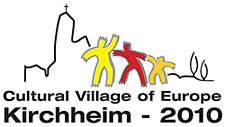Year 1998
In 1998 appeared in Wijk aan Zee the Enough Good Food Guarantee Plan.
![]()
Enough Good Food Guarantee Plan
Primary responsibility.
The country has always taken care of food production. This is its primary responsa-bility. And it needs room to do it. During 1999, when Wijk aan Zee will be the Cultural Village of Europe, a plan will be developed to guarantee the food production in Europe in a way that will not negati-vely affect the production of food in other continents. This plan will be developed with the help of farmers in the villages in the ten coun-tries with which Wijk aan Zee will cooperate in 1999 and with the help of experts who are interested in this approach. During the course of the year 1999 the plan will be presented.
At the moment this responsability of the rural areas is ignored. People who have never thought about anything concerning food production pass this subject by thoughtlessly and want to use the land for nature or recreation without realizing the consequences for food production.
Economically viable farmers.
The price of land makes it hard to turn any profit farming unless the quality of the food is reduced. The return on invested capital is very low in agriculture. Mechaniza-tion has caused low employment, because less than one person per hectare is needed. Our food-producers have been very inventive adjusting to the economy and remaining 'economically viable'. Mechanization, large-scale farming, increasing the yield per unit, monocultures and reducing the number of people working the land. Up to the use of poisons, which caused problems immediately.
Food shortage.
In Holland there doesn't seem to be any direct danger of food shortage. We are capable of buying food-supplies from elsewhere. The free-market-system takes the food automatically to those willing to pay most. And shortage is there where people have less purchasing power. To Dutch people therefor it doesn't seem urgent to watch the amount of food. But all is not what it seems. People whose food is bought right under their noses will at least cause a lot of instability. And if they are up to it physically peace will no longer be secure and neither will the food. The industrial approach of agriculture in Eastern and iddle-Europe has succeeded in creating a food shortage. Even the granary of Europe, The Ukraine, had to start importing food at a certain moment.
Quality.
The food production, dictated by economic laws, has influenced the quality of our food. The consumer instead of the producer determined the quality of the food. But a consumer is a capricious creature. The consumer accepts in general what is cheap and beautifully packaged. Only if the media depicts a product as being of bad quality, the consumer will react to these unseen flaws. (Mad Cow Disease, Pig Plague, Watery Tomatoes, Brown Rot, Salmonellae etc.) Then unpredictable things will happen. Every farmer can give a few examples of the capriciousness of the consumer.
Security.
If we develop a plan to secure the food supply, we will not have to react spastically and nervously to abstracts like market values and interest rates. The return of the land and animals is independent of what happens on Wall Street, of interest rates, employment or other checkpoints for the economy. Either the food is there or it isn't. It is stored somewhere or it isn't. It seems to me that for the people it would be a great comfort if they could be certain about their food.
Wijk aan Zee 23rd of March 1998



















